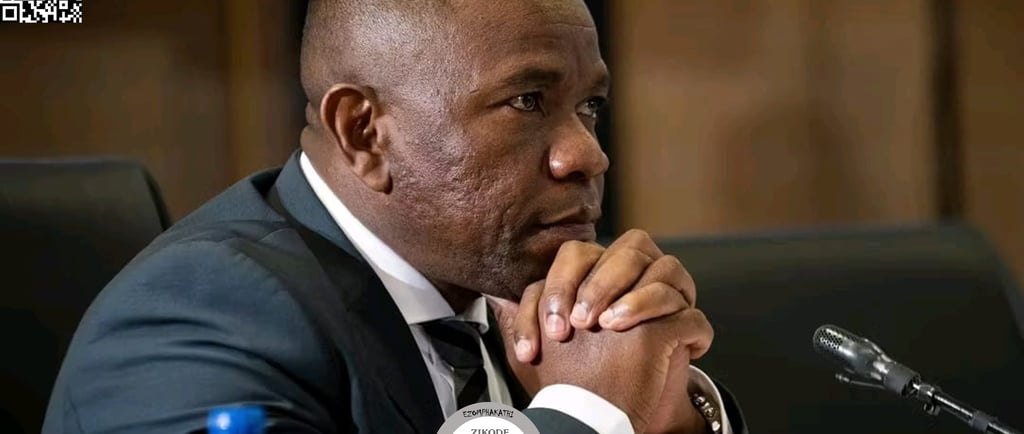MADLANGA COMMISSION: EXPLOSIVE WEEK OF REVELATIONS AS MKHWANAZI LIFTS THE LID ON SAPS, POLITICS, AND SYNDICATES
The Madlanga Commission of Inquiry into political killings and corruption has closed this week with a barrage of explosive testimony from KwaZulu-Natal Police Commissioner Lieutenant General Nhlanhla Mkhwanazi.
EZOMPHAKATHI


The Madlanga Commission of Inquiry into political killings and corruption has closed this week with a barrage of explosive testimony from KwaZulu-Natal Police Commissioner Lieutenant General Nhlanhla Mkhwanazi. From alleged ministerial involvement in syndicates, to interference in investigations, and corruption within correctional services, Mkhwanazi’s testimony has left the country gripped — and deeply concerned about the state of law enforcement.
WHO IS NHLANHLA MKHWANAZI?
Born in Edendale, Pietermaritzburg in 1973, Mkhwanazi joined the South African Police Service (SAPS) in 1993 and rose steadily through the ranks, leading the Special Task Force before becoming Acting National Commissioner in 2011. He currently serves as the KwaZulu-Natal Police Commissioner, appointed in 2021 by then Police Minister Bheki Cele. With over 30 years of service and advanced international training, Mkhwanazi has been at the forefront of major investigations. His contract is due to expire next year — but his name will likely be remembered for his testimony this week.
LINKING MINISTER MCHUNU TO A SYNDICATE
The headline shock came when Mkhwanazi directly accused current Police Minister Senzo Mchunu of being tied to a syndicate linked to political killings in KwaZulu-Natal. He claimed that communications and records demonstrate the minister’s awareness and involvement. “The Minister is fully involved in the syndicate… evidence is there on record,” Mkhwanazi declared.
He further revealed the scale of the Political Killings Task Team’s work: 612 case dockets, 436 arrests, 156 firearms recovered, 35 police officers arrested, and 29 life sentences secured. Yet, despite these successes, political interference allegedly derailed parts of the work.
SEIZED DOCKETS AND STALLED ARRESTS
Mkhwanazi testified that 121 crucial case dockets were seized from the provincial task team and sent to SAPS head office, effectively stalling pending arrests. Some of the dockets already had court orders for suspects to be taken into custody, but once moved, the arrests never materialised.
He also revealed that the task team had been instructed to disband by Minister Mchunu, though the directive was never formally communicated to him. The team continued to work, albeit with reduced manpower and resources.
COURTS UNDER FIRE FOR BAIL DECISIONS
Mkhwanazi was equally scathing of the justice system, criticising courts for granting bail to dangerous repeat offenders. He cited the example of Fisokuhle Ntuli, later linked to the Senzo Meyiwa case, who committed further murders while out on bail. “It simply means that the court is not taking seriously the risk that this individual has in society,” he said, warning that the practice undermines police efforts and puts witnesses at risk.
CAT MATLALA: PRIVILEGE AND CORRUPTION
Another key focus was alleged underworld figure Vusumuzi “Cat” Matlala. Mkhwanazi revealed that:
A cellphone was found in Matlala’s prison cell, allegedly smuggled in with the help of correctional officials.
Matlala’s vehicles were illegally registered and fitted with blue lights through Ekurhuleni municipal police connections.
Evidence of communication and money exchanges between Matlala and former Police Minister Bheki Cele raised new concerns over high-level relationships.
Matlala even held a position as a health risk manager within SAPS, raising questions about how a man under investigation for serious crimes could infiltrate the system.
“These privileges undermine the credibility of law enforcement,” Mkhwanazi warned, stressing that Matlala deliberately embedded himself in police and municipal structures.
PARLIAMENTARIAN UNDER SCRUTINY
Adding to the drama, Mkhwanazi implicated Member of Parliament Fadiel Adams, alleging that he abused his position to access intelligence information which was then misused.
WHAT’S NEXT?
The commission has promised more evidence in the coming weeks, with General Jabulani Khumalo and other investigators expected to testify. As it stands, Mkhwanazi’s testimony has widened the scope of inquiry from political killings to systemic corruption, stretching from local police to national leadership and correctional services.
For many South Africans, this week’s revelations paint a troubling picture of criminal infiltration, political interference, and weakened justice systems. The question remains: will the Madlanga Commission’s work finally turn the tide against the deadly entanglement of politics and crime?
